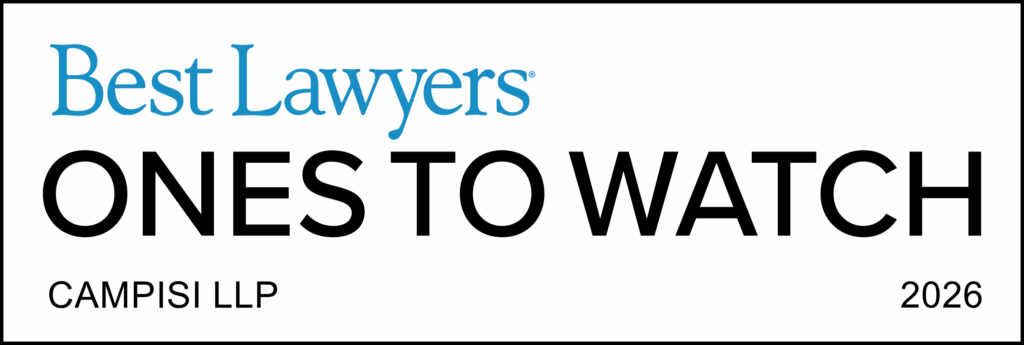
This policy relates to standards for providing the services of Campisi LLP (Campisi) to people with disabilities. This policy is guided by the Accessibility for Ontarians with Disabilities Act (AODA) Accessibility Standards for Customer Service, 429/07.
Campisi enjoys a reputation as one of the GTA’s most respected personal injury law firms. Daily, our people demonstrate a consistent ability to provide practical, creative and cost-effective advice, combined with an unyielding service commitment to our clients.
In fulfilling our mission, Campisi strives at all times to provide its services in a way that respects the dignity and independence of people with disabilities. We are also committed to giving people with disabilities the same opportunity to access our services and allowing them to benefit from the same services, in the same place and in a similar way as other clients.
The Accessible Client Service Policy applies to all individuals who provide services on behalf of Campisi. In this policy, the terms lawyer and staff include all lawyers, partners, associate counsel, staff and contract service providers of Campisi.
“Assistive devices” shall mean an auxiliary aid such as communication aids, cognition aids, personal mobility aids and medical aids (i.e. canes, crutches, wheelchairs, or hearing aids).
“Persons with Disabilities” shall mean those individuals who have a disability. “Disability” as defined under the Ontario Human Rights Code is:
“Service Animals” shall mean any animal individually trained to do work or perform tasks for the benefit of a person with a disability.
“Support persons” shall mean any person whether a paid professional, volunteer, family member, or friend who accompanies a person with a disability in order to help with communications, personal care or medical needs or with access to products or services.
Campisi is committed to excellence in serving all clients including people with disabilities and we will carry out our functions and responsibilities in the following areas:
We will communicate with people with disabilities in ways that take into account their disability.
We will train lawyers and staff who communicate with clients on how to interact and communicate with people with various types of disabilities.
We are committed to providing fully accessible telephone service to our clients. We will train lawyers and staff to communicate with clients over the telephone in clear and plain language and to speak clearly and slowly.
We will offer to communicate with clients by telephone relay, email, courier, mail and/or fax, if telephone communication is not suitable to their communication needs or is not available, provided the identity of the client has been verified.
We are committed to serving people with disabilities, who use assistive devices to obtain, use or benefit from our services. We will ensure that our lawyers and staff are trained and familiar with various assistive devices that may be used by clients with disabilities while accessing our services.
We will also ensure that lawyers and staff will know how to use, and instruct others in the use of, assistive devices if they are available for clients while visiting the office.
Within a reasonable time after receiving a request by, or on behalf of a person with a disability, Campisi shall make documents available in a format that is accessible to the person, unless it is not technically feasible to do so.
We are committed to welcoming people with disabilities who are accompanied by a service animal on the parts of our premises that are open to the public and other third parties. The service animal must be in the care of the person with a disability or their support person at all times.
We will also ensure that all lawyers and staff dealing with the public are properly trained in how to interact with people with disabilities who are accompanied by a service animal.
We are committed to welcoming people with disabilities who are accompanied by a support person. Any person with a disability who is accompanied by a support person will be allowed to enter the parts of our premises that are open to the public with his or her support person. At no time will a person with a disability who is accompanied by a support person be prevented from having access to his or her support person while on our premises.
Where confidentiality is important because of the kinds of information discussed, Campisi will obtain the consent of the client and may require the support person to sign a confidentiality agreement.
Campisi will provide clients with notice in the event of a planned disruption in the facilities or services usually used by people with disabilities. In the event of an unexpected disruption, Campisi will make reasonable efforts to contact clients with disabilities regarding disruptions prior to their scheduled meetings. This notice will include information about the reason for the disruption, its anticipated duration, and a description of alternative facilities or services, if available.
The notice will also be placed at public entrances where applicable and at reception.
Campisi will provide training to all lawyers and staff who deal with the public or other third parties on our behalf, and all those who are involved in the development and approval of client service policies, practices and procedures. Individuals in the following positions will be trained:
Lawyers, Law Clerks, Legal Assistants, Management and all Office and Administrative Staff.
This training will be provided during the new employee orientation period via E-Learning, which shall occur within the first month after a lawyer or staff commences their duties.
Training will include the following:
All lawyers and staff will be trained on policies, practices and procedures that affect the way services are provided to people with disabilities. Lawyers and staff will also be trained on an ongoing basis when changes are made to these policies, practices and procedures.
The ultimate goal of Campisi is to meet and surpass client expectations while serving clients with disabilities. Comments on our services regarding how well those expectations are being met are welcome and appreciated.
Feedback regarding the way Campisi provides services to people with disabilities can be made in the following ways:
Clients can expect to hear back within 10 business days. Our response will be in a format that respects the communication preference of the person with a disability. Additional time may be required for follow up depending on the format of response required.
We are committed to developing client service policies that respect and promote the dignity and independence of people with disabilities. Therefore, no changes will be made to this policy before considering the impact on people with disabilities.
Any policy of Campisi that does not respect and promote the dignity and independence of people with disabilities will be modified or removed.
This policy exists to achieve service excellence to clients with disabilities. If anyone has a question about the policy, or if the purpose of a policy is not understood, an explanation should be provided by, or referred to, the Manger, Human Resources & Operations.
Campisi is committed to identifying and taking steps to remove barriers to accessibility in customer service, information and communication, employment, and the built environment. We are committed to meeting and surpassing the requirements of the Accessibility for Ontarians with Disabilities Act, 2005 (the “AODA”), the Ontario Human Rights Code and all applicable regulations made thereunder.
This Policy and Multi-Year Accessibility Plan are made pursuant to the requirements of the AODA and the Integrated Accessibility Standards Regulation (“IAS Regulation”) of the AODA and address how Campisi will achieve accessibility in accordance with all legislative compliance requirements and schedules. This Policy and Multi-Year Accessibility Plan will be reviewed and updated as necessary at least every five years and posted on our website.
For purpose of this Policy and Plan, “disability” is defined as follows:
Campisi provides training to all its employees, partners and contracted staff on the requirements of the IAS Regulation, the Human Rights Code as it relates to persons with disabilities and Accessible Customer Service Policy in accordance with all statutory requirements, as well as others who are required to be trained pursuant to the AODA and associated regulations. Training is provided on an ongoing basis as necessary to comply with all statutory requirements.
Upon request, and in accordance with the compliance schedule set out in the IAS Regulation, Campisi will provide or arrange for the provision of Accessible Formats and Communication Supports for persons with disabilities in a timely manner and at a cost that is not greater than the cost charged to other persons, if any. Campisi will consult with the person making the request in determining the suitability of an accessible format or communication support and notify the public about the availability of these formats and supports.
In accordance with the requirements of the IAS Regulation, Campisi ensures that its feedback processes for receiving and responding to feedback are accessible to persons with disabilities by providing or arranging for the provision of accessible formats and communications supports, upon request. We will notify the public of the availability of “accessible formats” and “communication supports” including by posting this information online.
For purposes of this Policy and Plan, “accessible formats” may include but are not limited to large print, recorded audio and electronic formats, Braille and other formats usable by persons with disabilities and “communication supports” may include but are not limited to captioning, alternative and augmentative communication supports, plain language, sign language and other supports that facilitate effective communications.
In accordance with the compliance requirements set out in the IAS Regulation and subject to applicable exceptions, Campisi will ensure that its websites and the applicable web content will confirm with the World Wide Web Consortium Web Content Accessibility Guidelines (WCAG 2.0) Level AA by January 1, 2021.
Campisi is committed to ensuring that its employment practices are in compliance with the AODA, IAS Regulation and the Ontario Human Rights Code. Campisi is in the process of updating its written policies and practices to ensure compliance with all requirements of the IAS Regulation and in accordance with the compliance schedule.
Campisi will notify employees and the public about the availability of accommodation for applicants (including existing employees) with disabilities in its recruitment processes and specifically:
In accordance with the requirements of the IAS Regulation, Campisi shall inform its employees of its policies used to support its employees with disabilities, including but not limited to, policies on the provision of job accommodations that take into account an employee’s accessibility needs due to a disability. This information shall be provided to new employees as soon as practicable after they begin their employment and whenever there is a change to existing policies on the provision of job accommodations that take into account an employee’s accessibility needs due to a disability.
Where an employee with a disability so requests it, Campisi will consult with the employee to provide or arrange for the provision of accessible formats and communication supports for information that is needed in order to perform the employee’s job and information that is generally available to employees in the workplace, including training materials. Campisi will consult with the employee making the request in determining the suitability of an accessible format or communication support.
In accordance with the requirements set out in the IAS Regulation, Campisi shall continue to develop a process for the development of individual accommodation plans for employees with disabilities. Our processes will include the following elements:
Individual accommodation plans shall, if requested, include any information regarding Accessible Formats and Communication Supports provided; if requested, include individualized workplace emergency response information; and identify any other accommodation that is to be provided.
Campisi has in place documented return-to-work processes for employees who have been absent from work due to a disability and require disability-related accommodation in order to return to work. Building on that foundation, we will ensure that those processes clearly outline the steps that Campisi will take to facilitate the return to work process amongst other requirements that facilitate that process. Our return to work processes will include individualized accommodation plans.
Campisi shall take into account the accessibility needs and/or individual accommodation plans of employees when: using performance management processes; providing career development and advancement; and using redeployment.
Campisi provides individualized workplace emergency response information to employees who have a disability if the disability is such that the individualized information is necessary and the employer is aware of the need for accommodation. Campisi provides this information as soon as practicable after becoming aware of the need for accommodation.
If an employee who receives individualized workplace emergency response information requires assistance, with the employee’s consent, Campisi will provide the workplace emergency response information to the person designated by the employer to provide assistance to the employee.
In each case, Campisi reviews the individualized workplace emergency response information: when the employee moves to a different location in the organization, when overall accommodation needs or plans are reviewed, and when the employer reviews its general emergency response policies.
Campisi is committed to designing our facilities free from barriers and accessible to all persons we serve. Campisi will comply with the Design of Public Spaces Standards with respect to public spaces that are newly constructed or redeveloped in accordance with the requirements of the IAS Regulation.
In the event that we adopt self-serve kiosks, we shall have regard to accessibility in the design, procurement or acquisition of these kiosks.
Upon request, all of our policies can be made available in an accessible format and we can provide or arrange to provide communication supports as necessary.






Available seven days a week. We’ll meet you wherever works best: in person, online, or by phone.
Find us here: Ajax, Aurora, Barrie, Belleville, Bowmanville, Burlington, Caledon, Downtown, Guelph, Halton Hills, Hamilton, Kingston, Kitchener-Waterloo, Markham, Mississauga, Newmarket, Oakville, Oshawa, Peterborough, Pickering, Toronto, Vaughan, Woodbridge.
Choose your language to translate our website
Talk to a Toronto Personal Injury Lawyer Who Truly Listens
If you or someone you love has suffered a catastrophic injury, you deserve more than legal representation. You deserve a legal team that puts your healing, your dignity, and your future first.
Arabic, Creole Patoit, Croatian, Farsi, French, Greek, Hebrew, Hindi, Italian, Mandarin, Macedonian, Polish, Portuguese, Punjabi, Russian, Serbian, Spanish, Tagalog Filipino, Tamil, Turkish, Ukrainian, Urdu.